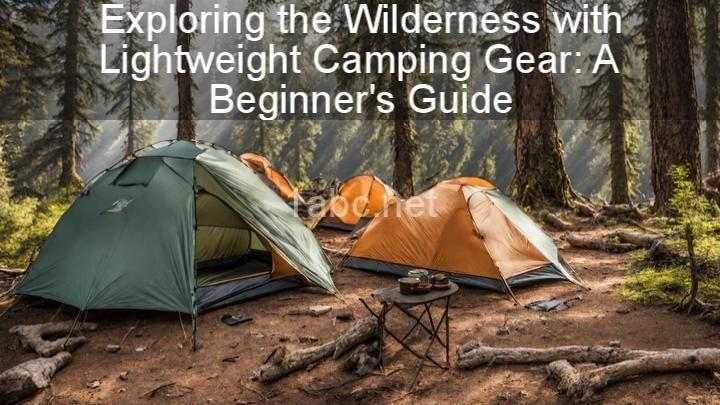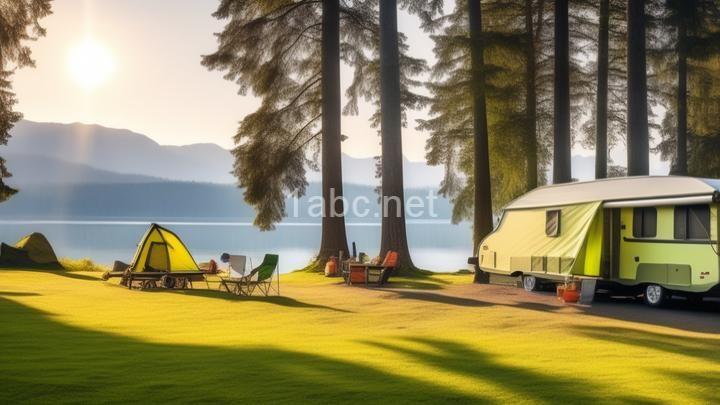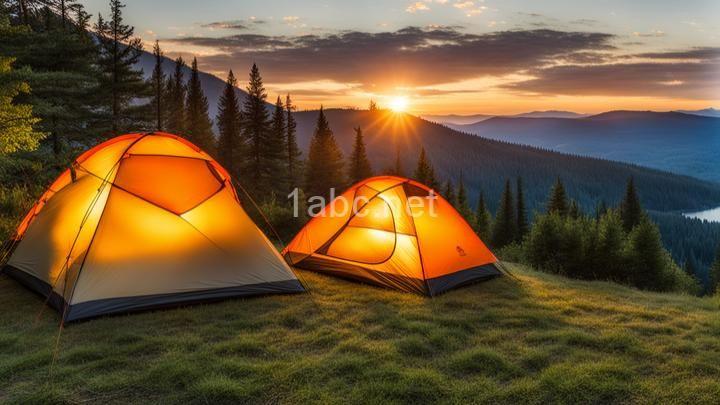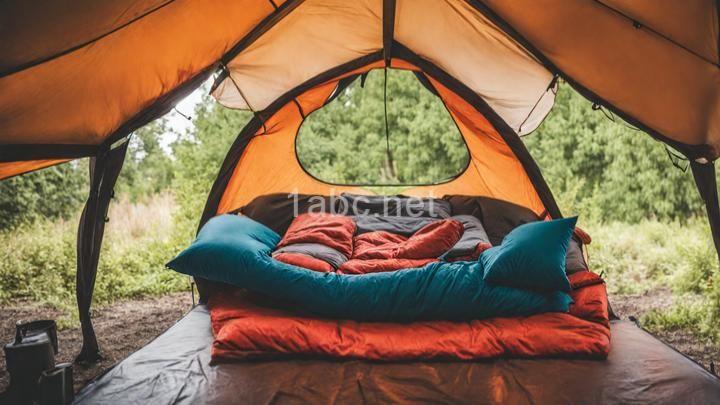Exploring the Wilderness with Lightweight Camping Gear: A Beginner's Guide

Introduction:
Welcome, fellow adventure seekers! If you're reading this, I can already tell that you have a burning desire to explore the great outdoors and experience the wonders of nature. And what better way to do that than by venturing into the wilderness with lightweight camping gear? In this beginner's guide, we will delve into the world of lightweight camping gear, providing you with tips, recommendations, and insights to help you embark on your camping journey with confidence.
Section 1: Understanding Lightweight Camping Gear
Before we dive into the specifics, let's first understand what lightweight camping gear is all about. Lightweight camping gear refers to equipment and tools that are designed to be compact, portable, and, as the name suggests, lightweight. This kind of gear is particularly suitable for beginners due to its ease of use, portability, and reduced physical strain. Whether you're planning a short weekend camping trip or a longer expedition, lightweight gear can make your experience more enjoyable and less physically demanding.
When it comes to lightweight camping gear, there are various options available in the market. From lightweight tents to sleeping bags, backpacks, cooking equipment, and lighting solutions, the choices can be overwhelming. Don't worry, though, as we will explore each of these in detail to help you make informed decisions.
Section 2: Essential Lightweight Camping Gear for Beginners
Let's now delve into the must-have items for a beginner's lightweight camping kit. These essentials will ensure that you have a comfortable and enjoyable experience in the wilderness.
- Tent: Choosing the right tent is crucial for a successful camping trip. Look for a lightweight, durable tent that is suitable for various weather conditions. Consider the number of people it can accommodate and its ease of setup.
- Sleeping Bag: Opt for a compact sleeping bag that provides insulation appropriate for different temperatures. Look for lightweight materials and efficient designs that offer warmth and comfort.
- Backpack: A comfortable backpack is your best friend when camping. Look for one that has proper weight distribution features, adjustable straps, and multiple compartments for organized packing.
- Cooking Equipment: Compact cooking stoves, utensils, and food storage options are essential for preparing meals in the wilderness. Look for lightweight, durable options that are easy to clean and pack.
- Lighting Solutions: When the sun goes down, having reliable lighting is crucial. Invest in a lightweight headlamp or lantern to ensure nighttime visibility and safety.
Section 3: Tips for Packing Efficiently
Now that you have your lightweight camping gear essentials, it's time to learn how to pack them efficiently. Maximizing space while maintaining the organization is key to a hassle-free camping experience.
- Prioritize Essentials: When packing, prioritize the essentials over non-essentials. Consider your needs, the duration of your trip, and the space and weight limitations of your backpack.
- Utilize Packing Cubes or Compression Sacks: Packing cubes or compression sacks can help you condense your items and save space. Categorize and compress your gear, making it easier to locate and access them when needed.
- Distribute Weight Evenly: To avoid strain on your back and shoulders, distribute the weight of your gear evenly within your backpack. Place heavier items closer to your back and lighter items towards the outside.
Section 4: Researching Campsites
Finding the perfect campsite is vital for a successful camping trip. Here are some tips for finding campsites suitable for beginners using lightweight camping gear:
- Research Accessibility and Facilities: Before heading out, research the accessibility of your chosen campsite. Consider factors like parking availability, proximity to amenities, and the presence of toilets or shower facilities.
- Consider Terrain Difficulty: As a beginner, it's important to choose campsites with terrain suitable for your skill level. Avoid steep or challenging terrains until you gain more experience.
- Water Sources and Proximity to Amenities: Look for campsites with nearby water sources for drinking and cooking purposes. Additionally, consider the proximity to amenities such as hiking trails, fishing spots, or scenic viewpoints.
- Online Resources and Recommendations: Utilize online resources such as camping forums, websites, and social media groups to gather information and seek recommendations from experienced campers. They can provide valuable insights and suggestions based on their firsthand experiences.
Section 5: Safety Precautions
When venturing into the wilderness, safety should always be a top priority. Here are some safety precautions to keep in mind:
- Carry a First Aid Kit: Always carry a well-stocked first aid kit and familiarize yourself with basic wilderness first aid techniques. Accidents can happen, and being prepared can make all the difference.
- Check Weather Forecasts: Before heading out, check the weather forecasts for your camping area. Be prepared for unexpected changes and pack appropriate clothing and gear to stay comfortable in different weather conditions.
- Wildlife Safety and Food Storage: Familiarize yourself with wildlife safety guidelines and proper food storage techniques. Keep your campsite clean and use bear-proof containers if necessary. Respect the wildlife and their natural habitats.
Section 6: Enjoying the Wilderness Experience
Now that you're well-prepared and equipped, it's time to embrace the adventure and make the most of your lightweight camping experience. Here are some suggestions to enhance your wilderness experience:
- Explore Hiking Trails: Look for hiking trails suitable for beginners in your chosen camping area. Hiking allows you to immerse yourself in nature, discover hidden gems, and enjoy breathtaking views.
- Engage in Outdoor Activities: Take advantage of the natural surroundings and engage in activities like fishing, photography, or birdwatching. These activities can deepen your connection with nature and create memorable experiences.
- Relax and Disconnect: Remember to take time to relax, disconnect from the digital world, and appreciate the beauty of nature. Embrace the peacefulness and serenity of the wilderness.
Conclusion:
Congratulations! You have now gained a comprehensive understanding of lightweight camping gear and the essential items you need to embark on your camping journey. By following the tips and recommendations provided in this beginner's guide, you are well on your way to creating unforgettable memories in the great outdoors.
Remember, every camping trip is a learning experience, and you will continue to refine your camping gear and techniques as you gain more experience. Don't be afraid to seek advice from seasoned campers and share your own discoveries along the way.
So pack your lightweight camping gear, lace up your hiking boots, and embrace the adventure that awaits you in the wilderness. Happy camping!
FREQUENTLY ASKED QUESTIONS
What is the purpose of this guide?
The purpose of this guide is to provide assistance and support on various topics. Whether you have questions about a specific subject or need help with a particular issue, this guide aims to provide you with helpful and reliable information.
Who is this guide intended for?
This guide is intended for anyone who is seeking assistance or looking for information on various topics. Whether you have questions about a particular subject or need guidance on using certain tools, I'm here to help!
Why is lightweight camping gear important?
Lightweight camping gear is important for several reasons:
- Portability: Lightweight gear is much easier to carry and transport, especially when going on long hikes or multi-day trips. It reduces the weight on your back and allows you to cover more ground without feeling weighed down.
- Comfort: Carrying heavy gear can be physically taxing and uncomfortable. Lightweight camping gear helps alleviate this burden, allowing you to enjoy your outdoor experience without unnecessary strain.
- Agility: When camping, you may need to move quickly or navigate through challenging terrain. Lightweight gear enables you to be more agile and maneuver easily, making it easier to set up camp or change locations as needed.
- Endurance: When every ounce counts, lightweight gear allows you to carry essential items while conserving energy. This is especially crucial for long-distance hiking or backpacking trips, where your endurance and stamina are vital.
- Flexibility: Lightweight gear provides more flexibility in packing and organization. Its compactness allows for efficient use of space, giving you room for additional necessities or personal items.
Overall, lightweight camping gear enhances your outdoor experience by reducing physical strain, increasing mobility, and improving overall enjoyment.
What are the benefits of using lightweight camping gear?
Using lightweight camping gear offers several benefits:
- Easy to carry: Lightweight camping gear is designed to be portable and can be easily carried in a backpack or a suitcase. This makes it more convenient for hikers or travelers who may have to walk long distances or navigate rugged terrain.
- Increased mobility: Since lightweight camping gear is lighter, it allows for greater mobility during outdoor activities. You can cover longer distances or explore more challenging trails without feeling weighed down by heavy gear.
- Less strain on the body: With lightweight gear, you can reduce the strain on your body while hiking or camping. This can help prevent fatigue and muscle soreness, allowing you to enjoy your outdoor adventures for longer periods of time.
- Faster setup and teardown: Lightweight camping gear is often designed to be quick and easy to set up and take down. This saves time and energy, allowing you to spend more time enjoying nature and less time wrestling with complicated equipment.
- Versatility: Many lightweight camping gear options offer versatility, meaning they can serve multiple purposes or be easily adapted to different environments or weather conditions. This allows you to pack less gear overall while still being prepared for a variety of situations.
- Eco-friendly: Lightweight gear often requires less material to manufacture, resulting in a smaller environmental footprint. Additionally, because it is lighter, it may consume less energy during transportation, further reducing its impact on the environment.
Overall, lightweight camping gear provides greater convenience, mobility, and comfort, enabling you to have a more enjoyable and fulfilling outdoor experience.




